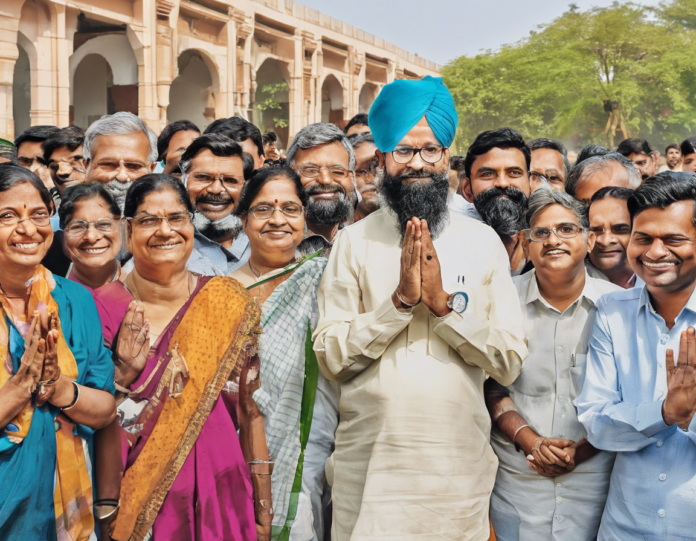With Lok Sabha Elections 2024 approaching, it is crucial for every eligible Indian citizen to exercise their right to vote and participate in the democratic process. The Election Commission of India conducts the general elections for the Lok Sabha, the lower house of Parliament, every five years to elect Members of Parliament (MPs) who will represent the people of India.
Eligibility to Register for Lok Sabha Elections 2024
Before registering for the Lok Sabha Elections 2024, it is essential to understand the eligibility criteria set by the Election Commission of India:
1. Age: Every citizen of India who is 18 years of age or above is eligible to register as a voter.
2. Citizenship: The individual must be a citizen of India.
3. Residence: The person should be a resident in the constituency where they wish to register as a voter.
4. Not disqualified: The individual should not be disqualified from voting due to any law.
How to Register for Lok Sabha Elections 2024
1. Online Registration:
- Visit the National Voters’ Service Portal (https://www.nvsp.in).
- Click on the “Apply online for registration of new voter/due to shifting from AC” option.
- Fill in the required details accurately in Form 6.
- Upload the necessary documents such as photograph and address proof.
- Submit the form online.
2. Offline Registration:
- Visit the nearest Electoral Registration Office (ERO) in your constituency.
- Collect Form 6 or download it from the Election Commission website.
- Fill the form with the required details.
- Attach photocopies of relevant documents.
- Submit the form in person at the ERO’s office.
3. Door-to-Door Registration:
- During special drives organized by the Election Commission, Booth Level Officers (BLOs) may visit households for voter registration.
- Make use of this opportunity to register as a voter at your doorstep.
Required Documents for Registration
When registering for the Lok Sabha Elections 2024, it is essential to have the following documents:
- Proof of Identity (PoI): Aadhar Card, Passport, Driving License, PAN Card, or any other government-issued photo identity card.
- Proof of Address (PoA): Aadhar Card, Passport, Driving License, Utility Bill, or any other document with the applicant’s address.
Checking Voter Registration Status
After submitting the voter registration application, individuals can check their status online through the Election Commission’s website. By entering the reference ID received during registration, one can track the progress of their application and confirm their voter registration status.
Voter ID Card
Once the registration process is complete, and the application is approved, the Election Commission will issue a Voter ID Card. This card serves as a crucial identification document for voting in elections. It is essential to carry the Voter ID Card to the polling station on election day to cast the vote successfully.
Importance of Voter Registration
Registering as a voter and participating in the electoral process is not just a right but a responsibility for every citizen in a democracy. By registering and voting, individuals contribute to the selection of their representatives and play a role in shaping the future of the country. It is a way to have a say in governance, policies, and decisions that affect the lives of all citizens.
FAQs
1. Can NRIs (Non-Resident Indians) register for Lok Sabha Elections?
Non-Resident Indians are not eligible to vote in Lok Sabha Elections unless they are physically present in their respective constituencies on polling day.
2. What is the deadline for voter registration for Lok Sabha Elections 2024?
The Election Commission announces the deadline for voter registration closer to the election dates. It is advisable to register as a voter at the earliest to avoid any last-minute hassles.
3. Can I register as a voter in more than one constituency?
No, a person can only be registered as a voter in one constituency. If someone registers in multiple places, it is considered an offense.
4. Is it mandatory to have a Voter ID Card to vote?
While having a Voter ID Card is the most common form of identification for voting, alternative identification documents such as Aadhar Card, Passport, or Driving License can also be used to cast the vote.
5. What should I do if my voter registration application is rejected?
If your voter registration application is rejected, you will be informed of the reasons. You can reapply with the correct information and documents as per the guidelines provided by the Election Commission.
Conclusion
Registering for the Lok Sabha Elections 2024 is a fundamental right and duty of every eligible citizen. By participating in the electoral process, individuals contribute to the democratic system and have a voice in governance. It is essential to follow the registration procedures diligently, ensure the required documents are in order, and check the voter registration status to be ready for the upcoming elections. Let’s collectively strive to make our democracy stronger by exercising our right to vote.






